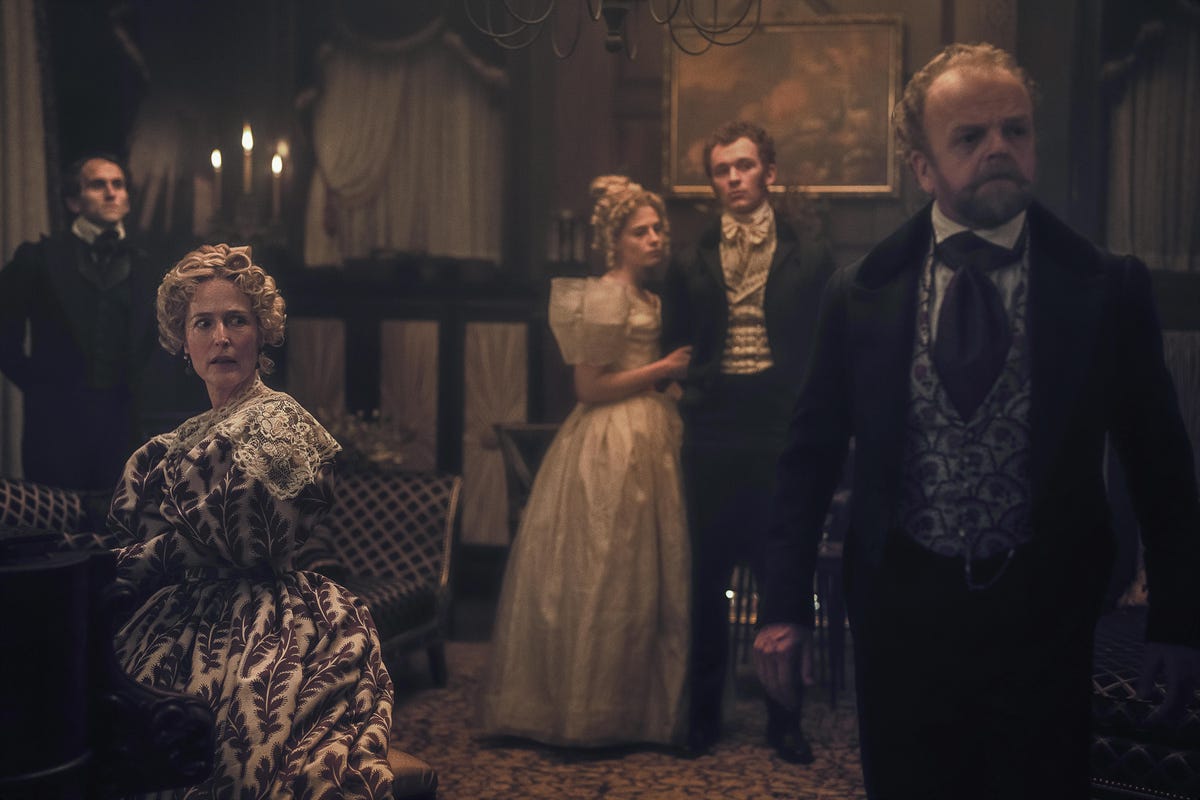
Netflix’s The Pale Blue Eye is a rollercoaster of a murder mystery, not least because it involves American poet Edgar Allan Poe.
Christian Bale stars as ex-detective Augustus Landor, who’s enlisted by West Point Military Academy in 1830 to investigate a gruesome murder. Who does he meet there but a young cadet and poet (Harry Melling), an inquisitive mind and helpful confidante. Did this experience influence the real historical figure’s fascination with the macabre?
Is The Pale Blue Eye based on a true story?
Short answer: No. Edgar Allan Poe wasn’t really involved with solving a series of gruesome murders. Grizzled detective Landor is a fictional creation. But there are some elements of The Pale Blue Eye inspired by the truth.
Based on Louis Bayard’s historical fiction murder mystery novel of the same name, The Pale Blue Eye is set when the real Poe spent six months at the United States Military Academy at West Point, New York. What cut his stay short? He wanted to write poetry, not attend classes or perform drills. After choosing to neglect his duties, he was court-martialed and expelled.
Author Bayard “filled in” the details of what happened at West Point, a kind of origin story. He tied the real Poe’s penchant for the macabre with the fictional storyline incorporating themes of death.
What does ‘The Pale Blue Eye’ refer to?
This title was lifted from Poe’s short story The Tell-Tale Heart. In the story, the narrator describes his murder of an old man with a pale blue eye. It’s one of Poe’s best-known short stories and considered a classic of the Gothic fiction genre.

Gillian Anderson as Julia, Harry Melling as Edgar Allen Poe, Lucy Boynton as Lea, Harry Lawtey as Artemus and Toby Jones as Dr. Marquis.
Scott Garfield/Netflix
The ending of Netflix’s The Pale Blue Eye, explained
The Pale Blue Eye begins when alcoholic New York ex-detective Augustus Landor is enlisted by the West Point Military Academy to investigate the hanging of Cadet Leroy Fry. Mysteriously, his heart has been removed and a ripped note is found clutched in his hand.
Another cadet, Edgar A. Poe, approaches Landor and tells him the murderer must be a poet, because of the symbolic nature of the removed heart. The pair analyze the torn note and deduce that someone had summoned Fry to a secret meeting. When a cow and a sheep are found butchered with their hearts removed, the military officers suspect satanic practices are at play.
A second cadet, Ballinger, is then found hanged, with his heart and genitals removed. Later, a third cadet, Stoddard, goes missing. Landor linkers Stoddard to Ballinger and Fry through Fry’s diary. He suspects Stoddard fled because he believes he’ll be the next victim.
Landor becomes suspicious of the Marquis family — “They act like people who are guilty of something,” he says. Visiting their handsome house for dinner, he takes his chance to snoop upstairs and discovers an old officer’s uniform. Whoever mutilated Fry’s body was impersonating an officer.

Poe falling in love.
Scott Garfield/Netflix
Dr. Marquis admits that his ill daughter Lea, whose seizures he failed to cure, told him one day that she communicates with her late grandfather, a witch hunter. Dr. Marquis turned a blind eye to Lea, her brother Artemus and mother Julia conducting blood rituals, because they appeared to improve Lea’s condition. They claim to have never murdered anyone, however.
In love with Lea, Poe ends up drugged in a basement room where Lea and Artemus are about to cut out his heart. Landor arrives and rescues Poe, as well as Julia, but Lea and Artemus are killed in the fire.
There’s still one final twist in the tale. Poe connects Landor’s writing style with the writing in the torn note and realizes he must be the true killer. Poe learns from Patsy, Landor’s lover, that three men — Fry, Ballinger and Stoddard — raped Landor’s daughter Mathilde. She didn’t run away, like Landor said. Years later, still traumatized, Mattie committed suicide by jumping off a cliff.
Landor avenged his daughter by killing Fry, but couldn’t remove the body before a cadet approached on patrol. Later, Lea and Artemus stole Fry’s heart. Landor mutilated Ballinger to make it look like the same occultists were behind it, also planting the dismembered cow and sheep.
Does Poe turn Landor in? Unsurprisingly, no. After forming a father son bond, and sympathizing with Landor over Mattie, Poe burns the two notes — the only evidence Landor is guilty. Feeling somewhat at peace, Landor returns to the cliff where Mattie died, and releases her hair ribbon, saying, “Rest, my love.”
